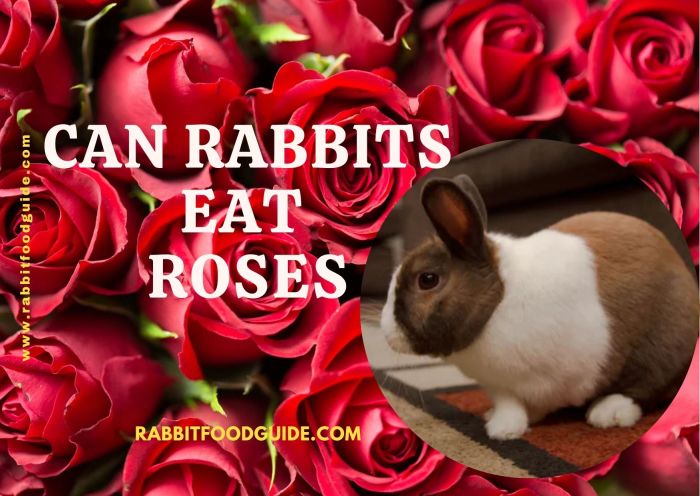Rabbits, with their adorable hops and curious nature, have captured the hearts of many. As responsible pet owners, it’s crucial to understand their dietary needs and potential risks. Among the many questions that arise, one that has sparked curiosity is whether rabbits can indulge in the beauty of roses.
Join us as we delve into the world of rabbit nutrition and explore the potential toxicity of roses, offering alternatives to keep your furry companions healthy and happy.
Roses, with their vibrant blooms and fragrant aroma, adorn gardens and landscapes worldwide. But are these thorny wonders a safe treat for our beloved rabbits? Let’s uncover the truth and ensure the well-being of our cherished pets.
Rabbit Diet
Rabbits are herbivores, meaning their diet consists primarily of plant-based foods. They have a unique digestive system that allows them to efficiently break down and absorb nutrients from vegetation.
The nutritional requirements of rabbits include:
- Fiber: Essential for maintaining a healthy digestive system and preventing gastrointestinal issues.
- Protein: Necessary for growth, repair, and maintenance of body tissues.
- Carbohydrates: Provide energy for daily activities.
- Fats: Important for energy storage and absorption of certain vitamins.
- Vitamins and minerals: Essential for overall health and well-being.
Common foods that rabbits consume include:
- Hay: A staple food providing fiber and essential nutrients.
- Leafy greens: Rich in vitamins, minerals, and antioxidants, such as romaine lettuce, kale, and dandelion greens.
- Vegetables: Offer a variety of nutrients and can be given in moderation, such as carrots, celery, and bell peppers.
- Fruits: Should be given sparingly due to their high sugar content, such as apples, bananas, and berries.
- Pellets: Commercially produced food that provides a balanced diet, but should be limited to prevent overeating.
Rose Plant Characteristics
Roses are popular ornamental plants that are known for their beautiful flowers and sweet fragrance. They come in a wide variety of shapes, sizes, and colors, and can be grown in a variety of climates.
Rose plants are typically woody shrubs that can grow to be several feet tall. They have thorny stems and large, showy flowers. The flowers of roses are typically composed of five petals, and can be single or double. Roses come in a wide range of colors, including red, pink, white, yellow, and purple.
Environmental Conditions
Roses thrive in well-drained soil that is rich in organic matter. They prefer full sun to partial shade, and need regular watering. Roses are relatively cold-hardy, but they can be damaged by severe frosts. In areas with cold winters, roses should be mulched to protect their roots from freezing.
Potential Toxicity of Roses to Rabbits

Roses, with their vibrant hues and alluring fragrance, are popular garden plants. However, it is crucial to be aware of their potential toxicity to rabbits, who may find these plants irresistible.The potentially toxic components of roses include the leaves, stems, and thorns.
These parts contain a substance called cyanogenic glycosides, which can release cyanide when ingested. Cyanide is a potent toxin that can cause serious health issues or even death in rabbits.Rabbits may ingest roses through direct consumption of the plant or by accidentally ingesting plant debris that has contaminated their food or water.
Ingestion of even small amounts of roses can be hazardous, especially for young or vulnerable rabbits.
Symptoms of Rose Toxicity in Rabbits
Symptoms of rose toxicity in rabbits can vary depending on the amount ingested. Common symptoms include:* Difficulty breathing
- Rapid heart rate
- Tremors
- Weakness
- Vomiting
- Diarrhea
- Seizures
- Respiratory failure
- Death
If you suspect that your rabbit has ingested roses, it is essential to seek veterinary attention immediately. Prompt treatment can significantly increase the chances of a positive outcome.
Alternatives to Roses for Rabbits
Roses may not be the most suitable option for rabbits due to their potential toxicity. Fortunately, there are numerous safe and nutritious alternatives that provide essential nutrients and support rabbit health.
These alternatives offer a variety of flavors, textures, and nutritional benefits, ensuring a balanced and enjoyable diet for your rabbit.
Leafy Greens
- Kale: Rich in vitamins A, C, and K, as well as fiber and antioxidants.
- Romaine lettuce: High in water content and fiber, promoting hydration and digestive health.
- Spinach: Contains iron, calcium, and vitamins A and C, but should be fed in moderation due to its high oxalic acid content.
Herbs
- Basil: Provides antioxidants, anti-inflammatory properties, and a distinct flavor.
- Cilantro: Rich in vitamins A and C, as well as minerals like potassium and magnesium.
- Parsley: Contains vitamins A, C, and K, as well as chlorophyll, which supports blood health.
Fruits
- Apples: High in fiber, vitamins A and C, and antioxidants, but should be fed in moderation due to their sugar content.
- Bananas: Rich in potassium and fiber, but should be given sparingly as treats.
- Berries (blueberries, strawberries, raspberries): Packed with antioxidants and vitamins, but should be fed in small amounts.
Closing Summary
In conclusion, while rabbits may occasionally nibble on rose petals without significant harm, it’s essential to prioritize their health by providing a balanced diet rich in hay, fresh vegetables, and limited pellets. By understanding the potential risks and exploring safe alternatives, we can ensure that our rabbits thrive and enjoy a long, healthy life.
Remember, responsible pet ownership involves making informed choices that prioritize the well-being of our furry companions.
Q&A
Can rabbits eat rose petals?
Yes, rabbits can occasionally eat rose petals in small amounts without causing harm. However, it’s not recommended as a regular part of their diet.
What parts of the rose plant are toxic to rabbits?
The leaves, stems, and thorns of rose plants contain cyanogenic glycosides, which can release toxic hydrogen cyanide when ingested in large quantities.
What are safe alternatives to roses for rabbits?
Safe alternatives include dandelion greens, romaine lettuce, carrots, celery, and apples. These provide essential nutrients and fiber without the potential risks associated with roses.